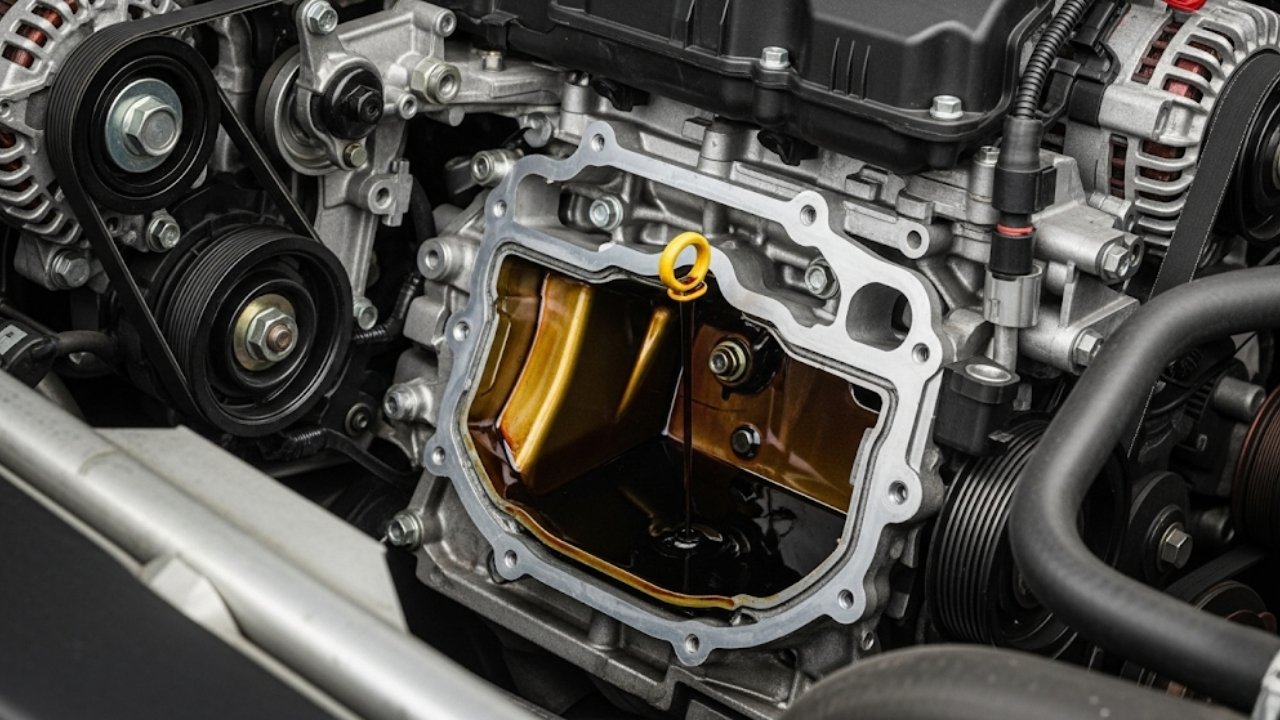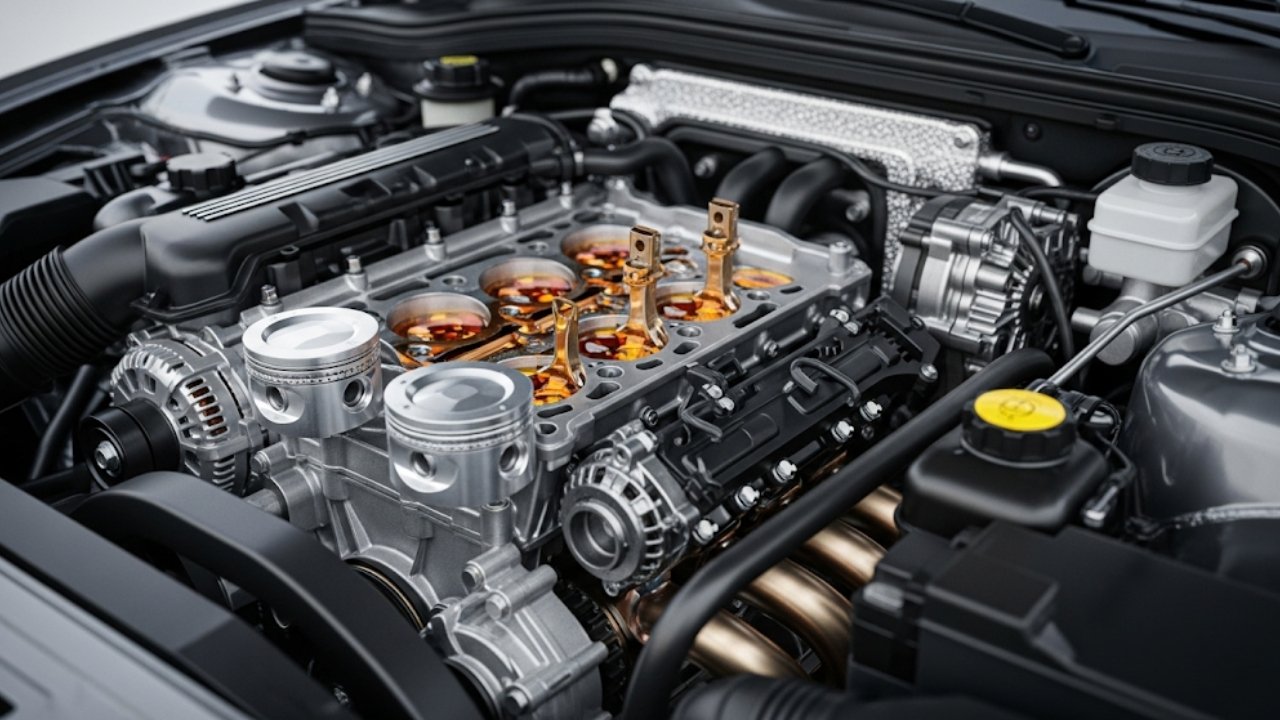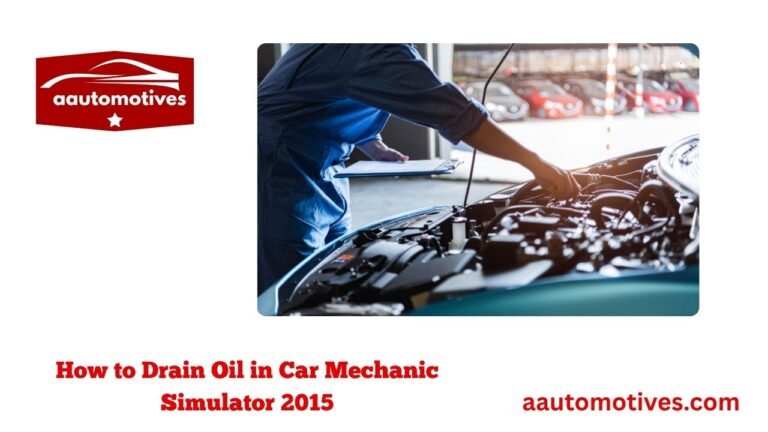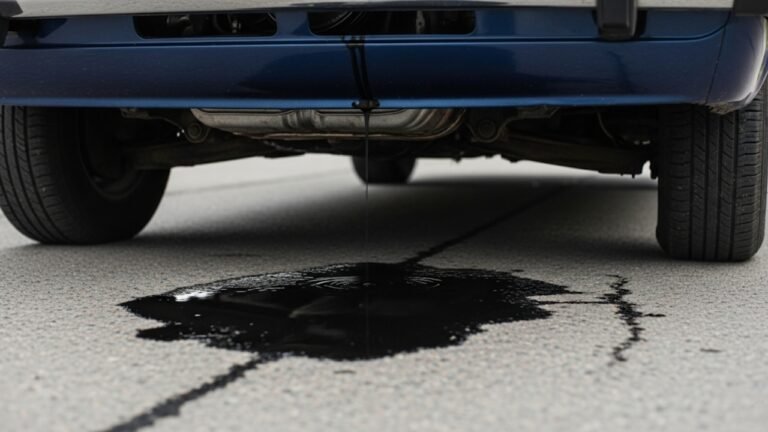Can No Oil Cause the Car Not to Start?

Have you ever jumped into your car on a busy morning, turned the key, and… nothing? Not even a cough or a hiccup from the engine. You sit there, staring at the dashboard, thinking, “Did I forget something?” Here’s the kicker: it might just be your engine oil — or rather, the lack of it.
It sounds strange at first, right? You might think “can no oil cause the car not to start?” Isn’t oil only important once the car is running? Surprisingly, the answer is yes, and it’s more serious than you think.
Let’s dive deep — but in a friendly, easy-to-understand way — into why no oil in your car can lead to it not starting, how this happens, what signs to look out for, and what you can do about it. We’ll also share real-life stories, relatable examples, and simple steps to avoid disaster.
Why Engine Oil is the Unsung Hero of Your Car

Now, when someone asks, “can no oil cause the car not to start?”, the answer goes beyond a simple yes or no. It depends on how long the engine has been without oil, how much damage has occurred, and what warning signs were ignored.
Let’s explore what oil really does:
Key Functions of Engine Oil:
-
Lubricates engine parts to prevent metal-on-metal contact
-
Cools down engine by reducing frictional heat
-
Cleans debris and carbon buildup
-
Protects from rust and corrosion
-
Seals gaps between piston rings and cylinder walls
So yes, without oil, your engine is in trouble — and starting it might just be impossible.
The Cold Reality: Can No Oil Cause the Car Not to Start?
Let’s break this down simply. If your engine completely runs out of oil, here’s what can happen:
-
Starter clicks, but engine doesn’t crank
-
Car cranks, but doesn’t turn over
-
No response at all
-
Engine seizes completely
All of these are potential symptoms. So, to the main question: can no oil cause the car not to start? Absolutely. And here’s how:
⚙️ Why Your Car Might Refuse to Start Without Oil:
| Reason | Explanation |
|---|---|
| Seized engine | Metal parts overheat and weld together due to friction |
| Low compression | Pistons and cylinders are damaged, losing power to start |
| Starter motor strain | Overworked trying to crank a jammed engine |
| Engine control unit (ECU) | Some cars won’t start if the ECU detects critical oil pressure loss |
It’s like trying to jog with no blood in your body. It just doesn’t work.
Personal Story: A Costly Lesson in Oil Neglect
A friend of mine, Kamal, owns a 2009 Toyota Corolla. One weekend, he planned a long drive to Sylhet. A few days before, he noticed a warning light on the dashboard — the oil light. He thought, “It’s just a short trip. I’ll get it changed next week.”
Big mistake.
Halfway through the trip, the engine started knocking. Then, it just stopped. The car wouldn’t start again. Towed to a mechanic, the diagnosis was grim: the engine had seized. The repair bill? Over $3,000.
Could he have prevented it? Yes — just by checking and topping off his engine oil.
What Happens Inside an Engine with No Oil?
When you crank the engine, a lot of fast, hot movement happens. Pistons pump. Valves open and shut. The crankshaft spins. All these parts need smooth movement. Oil coats them, reducing wear and tear.
Without oil, metal rubs against metal. Heat builds up fast. Parts expand. Seizing happens. Think of it like running a marathon in summer heat with no water. You’ll collapse — and so will your engine.
If you try to start your car with no oil, here’s what might happen:
-
The starter motor might struggle or burn out
-
The engine might turn once or twice, then lock
-
Your battery might drain trying to turn over a frozen engine
The result? A heart-wrenching click and silence.
Warning Signs You Should Never Ignore
Before your engine says its last goodbye, it usually sends signals. Pay attention to these:
Common Red Flags:
-
Oil warning light stays on or blinks
-
Burning oil smell from the hood
-
Ticking or knocking noise while driving
-
Overheating even in normal weather
-
Smoke from the exhaust
Ignoring these signs is like ignoring chest pain during a workout — dangerous and costly.
How Long Can a Car Run Without Oil Before It Dies?
Surprisingly, not very long. Depending on the engine, a car can run for as little as 30 seconds to a few minutes with zero oil before permanent damage begins.
Even modern cars with strong engines can’t survive without lubrication. Friction causes wear almost immediately. Within a few minutes:
-
Bearings fail
-
Pistons warp
-
Engine overheats
-
Components seize
At that point, restarting the engine is impossible without major repairs or full replacement.
How to Check Oil Like a Pro (Takes 2 Minutes!)
If you’re worried, don’t panic. Checking your engine oil is super easy. You don’t need tools, just a tissue and a few minutes.
️ Step-by-Step to Check Engine Oil:
-
Park on a flat surface and turn off engine
-
Let the engine cool for 10–15 minutes
-
Open the hood and find the dipstick
-
Pull it out, wipe clean, and reinsert fully
-
Pull out again and check oil level and color
-
Healthy oil: Amber and clear
-
Bad oil: Dark, dirty, gritty
-
If oil is below the minimum line, top it up immediately.
Bullet Points: Key Takeaways So Far
-
Yes, can no oil cause the car not to start — especially if the engine has seized
-
Engine oil is critical for lubrication, cooling, and protection
-
Ignoring oil warning lights can lead to total engine failure
-
Without oil, starting your car may lead to worse damage
-
Always check your oil monthly — it only takes 2 minutes
Preventive Tips to Avoid Engine Oil Disasters
Let’s be honest — most of us ignore maintenance until it’s too late. But a few habits can save you thousands.
Easy Prevention Tips:
-
Check oil every 1,000 km or once a month
-
Get oil changes as per manual — usually every 5,000 to 10,000 km
-
Use the correct oil grade for your engine
-
Pay attention to dashboard lights
-
Fix leaks quickly — even small ones can drain oil over time
Think of it like brushing your teeth. Skipping once may not hurt, but keep skipping, and the damage becomes serious.
PAUSE POINT
We’re at the halfway mark (around 1,250 words). So far, we’ve:
-
Introduced the topic
-
Answered the question can no oil cause the car not to start
-
Provided technical explanations, a personal story, a table, and bullet points
-
Offered warnings and prevention tips
What to Do If Your Car Won’t Start Due to No Oil
So, you’ve tried starting the car. Nothing. Then you check the oil dipstick — and it’s bone dry.
Here’s what not to do: Don’t keep trying to start it. You might cause even more damage. Instead, follow these steps:
️ What You Should Do:
-
Stop cranking the engine immediately.
-
Check the oil level with the dipstick.
-
If it’s empty, add the recommended engine oil slowly.
-
Wait 10 minutes, then try starting again.
-
If the engine still doesn’t turn, call a mechanic or tow the car.
If the engine hasn’t seized, topping up oil may help it start again. But if damage has already occurred, restarting could make things worse. Be patient, and don’t risk it.
Cost of Repair vs. Cost of Prevention
Let’s talk numbers. Because sometimes, fear of cost makes people delay oil changes. Ironically, this delay costs more in the long run.
Average Costs Breakdown:
| Action | Estimated Cost (USD) |
|---|---|
| Oil change | $30–$90 |
| Synthetic oil change | $60–$150 |
| Engine inspection | $80–$150 |
| Minor engine repair (gaskets) | $300–$700 |
| Full engine rebuild | $2,500–$4,500 |
| Engine replacement | $4,000–$7,000+ |
See the contrast?
A $50 oil change could save you from spending $5,000 later. This isn’t fearmongering — it’s simple, logical math.
Frequently Asked Questions (FAQs)
❓1. Can no oil cause the car not to start immediately?
Yes. If your car has been running dry, components may overheat or seize. Some newer vehicles also prevent startup when oil pressure is critically low to protect the engine.
❓2. How can I tell if my engine is damaged from no oil?
Signs include knocking/tapping sounds, smoke, burning smells, and the engine not turning over. A mechanic can confirm damage with diagnostics.
❓3. If I add oil, will the car start?
Only if the engine hasn’t already seized. Adding oil helps if low oil was the only issue. But if damage has occurred, adding oil may not help.
❓4. Can an oil change fix engine starting problems?
Yes — if the only issue was old or low oil. But if the engine has been damaged, a simple oil change won’t reverse internal wear.
❓5. Why didn’t I see a warning light before this happened?
Oil sensors don’t always detect gradual leaks. Or, your sensor may have failed. Always check oil manually — don’t rely only on dashboard lights.
❓6. How often should I change my engine oil?
Follow your car’s manual. Typically, change it every 5,000 to 10,000 km — sooner if you drive in tough conditions.
❓7. Can I use any oil when the engine is dry?
No. Use only the manufacturer-recommended oil type and grade. Wrong oil can cause more harm than help.
❓8. Can synthetic oil prevent this issue?
Synthetic oil lasts longer and handles heat better, but even it needs timely replacement. No oil = still a problem.
Understanding Oil Pressure and Sensors
Sometimes, even with oil present, your car might not start if oil pressure sensors detect a fault. Modern engines are smart. If the system believes starting could damage the engine, it might block ignition.
This isn’t a flaw — it’s protection.
Make sure your oil pressure sensor is working properly. If not, replace it. It’s cheaper than fixing an engine.
Can You Push Start a Car With No Oil? (Spoiler: Don’t Try)
You’ve seen it in movies — push the car downhill, pop the clutch, and the engine roars to life. But what if your engine has no oil?
Please don’t.
Push starting might temporarily fire the engine up, but it’ll destroy internal parts without lubrication. Instead, tow the vehicle and let a pro inspect it.
This method is for dead batteries — not dead engines.
Checklist: What to Do When the Car Won’t Start and You Suspect Low Oil
Here’s a quick-action checklist to help you troubleshoot without panic:
✅ Check for oil warning lights
✅ Pull out the dipstick and inspect oil level
✅ Top up with recommended engine oil
✅ Wait before retrying to start the engine
✅ Don’t crank repeatedly — it drains the battery
✅ Listen for strange sounds (clicks, knocks)
✅ Call a mechanic if unsure
✅ Don’t try push-starting
✅ Check for leaks under the car
✅ Get the engine inspected if the issue persists
A Gentle Reminder From a Fellow Driver
We all live busy lives. Oil changes often take the backseat to more urgent matters. But think of engine oil like drinking water for your car — invisible, cheap, yet absolutely essential.
We lock our doors before sleep. We double-check gas before a road trip. Why not check the oil too?
I’ve made the mistake of ignoring an oil light once. I thought it could wait a day. That day cost me weeks of garage time and a hefty bill. Let that be a warning — not just a story.
Final Thoughts: Can No Oil Cause the Car Not to Start?
Let’s wrap it up.
Yes, can no oil cause the car not to start? It sure can — and more than that, it can destroy your engine entirely. It’s not about if, but when the damage kicks in.
Keep a close eye on oil levels, trust your instincts, and listen to your car. It speaks in lights, sounds, and sometimes silence.
Key Takeaways:
-
Never ignore oil warning lights
-
Don’t rely only on sensors — check manually
-
Regular maintenance saves you time, money, and stress
-
Yes, no oil can cause a car not to start — even a new one
-
Preventative care is always cheaper than engine repair
Your car is a companion on life’s journey. Treat it well, and it’ll take you far — literally.






